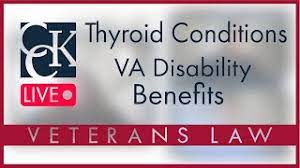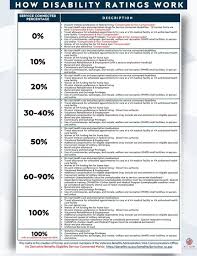Title: Understanding VA Disability Benefits for Hypothyroidism: A Comprehensive Guide
Introduction:
Hypothyroidism is a medical condition that affects the thyroid gland, leading to an underactive thyroid. This condition can cause various symptoms such as fatigue, weight gain, depression, and cognitive impairment. For veterans who suffer from hypothyroidism as a result of their military service, it is important to understand the VA disability benefits available to them.
Eligibility for VA Disability Benefits:
To be eligible for VA disability benefits for hypothyroidism, veterans must demonstrate that their condition is connected to their military service. This can be established through medical records and evidence linking the onset or aggravation of hypothyroidism to their time in service.
Filing a Claim:
To initiate the process, veterans should file a claim with the Department of Veterans Affairs (VA). The claim should include relevant medical evidence, such as diagnoses, treatment records, and any nexus opinions from healthcare professionals linking hypothyroidism to military service.
Rating Criteria:
VA disability benefits are awarded based on the severity of the condition and its impact on daily functioning. Hypothyroidism is evaluated under the VA’s Schedule for Rating Disabilities (VASRD), specifically under endocrine disorders. The rating ranges from 0% to 100%, with higher ratings indicating greater disability.
Evidence Requirements:
When filing a claim for hypothyroidism, it is crucial to provide comprehensive medical evidence supporting your case. This may include diagnostic test results, physician statements describing symptoms and limitations, treatment records, and any other relevant documentation.
Secondary Service Connection:
In some cases, veterans may have developed hypothyroidism as a secondary condition due to another service-connected disability or medication prescribed by the VA. It is important to explore all possible connections when filing a claim for compensation.
Appealing Denied Claims:
If your initial claim for VA disability benefits is denied, you have the right to appeal the decision. It is advisable to seek assistance from a veterans service organization or an experienced attorney who specializes in VA disability claims to navigate the appeals process effectively.
Conclusion:
VA disability benefits for hypothyroidism can provide financial support and access to necessary medical care for veterans who are affected by this condition. Understanding the eligibility criteria, filing requirements, and rating criteria is essential to increase the chances of a successful claim. If you believe that your hypothyroidism is service-connected, it is important to gather all relevant medical evidence and seek professional guidance throughout the claims process. Remember, you served our country, and it’s our duty to ensure you receive the support you deserve.
6 Essential Tips for Obtaining 100% VA Disability for Hypothyroidism
- Understand the eligibility criteria
- Gather comprehensive medical documentation
- Seek professional assistance
- Complete the required forms accurately
- Provide strong supporting evidence
- Appeal if necessary
Understand the eligibility criteria
Understanding the Eligibility Criteria for 100% VA Disability for Hypothyroidism
When it comes to applying for VA disability benefits for hypothyroidism, understanding the eligibility criteria is crucial. The Department of Veterans Affairs (VA) has specific guidelines that determine who qualifies for a 100% disability rating. Here are some key points to consider:
- Service Connection: To be eligible for VA disability benefits, you must establish a connection between your hypothyroidism and your military service. This can be done by providing medical evidence that demonstrates the onset or aggravation of hypothyroidism during your time in service.
- Medical Documentation: Gathering comprehensive medical documentation is essential to support your claim. This includes diagnosis reports, treatment records, and any other relevant medical evidence that links your hypothyroidism to your military service.
- Nexus Opinion: Obtaining a nexus opinion from a healthcare professional can significantly strengthen your claim. A nexus opinion is a medical statement that establishes the connection between your military service and the development or worsening of hypothyroidism.
- Severity of Symptoms: The severity of your symptoms plays a crucial role in determining the disability rating you may receive. To qualify for a 100% disability rating, you must demonstrate that your symptoms significantly impair your ability to work and perform daily activities.
- Functional Impairment: It’s important to provide evidence showing how hypothyroidism affects your daily life and functional abilities. This can include limitations in physical activities, cognitive impairment, fatigue, depression, or weight gain.
- Secondary Service Connection: In some cases, hypothyroidism may be related to another service-connected condition or medication prescribed by the VA. Exploring possible secondary connections can help strengthen your claim.
- Seek Professional Assistance: Navigating the VA disability claims process can be complex and overwhelming. Consider seeking assistance from veterans’ service organizations or experienced attorneys who specialize in VA claims. They can provide valuable guidance and support throughout the application process.
Understanding the eligibility criteria is a crucial step towards successfully applying for 100% VA disability for hypothyroidism. By gathering strong medical evidence, establishing a service connection, and seeking professional assistance, you can increase your chances of receiving the benefits you deserve. Remember, these benefits are designed to support veterans like you who have sacrificed for our country’s well-being.
Gather comprehensive medical documentation
Title: Essential Tip for Obtaining 100% VA Disability for Hypothyroidism: Gather Comprehensive Medical Documentation
Introduction:
When it comes to seeking VA disability benefits for hypothyroidism, one crucial tip stands out among the rest: gather comprehensive medical documentation. The importance of thorough and well-documented evidence cannot be overstated in supporting your claim and increasing the likelihood of receiving a 100% disability rating.
Why Comprehensive Medical Documentation Matters:
Comprehensive medical documentation plays a vital role in establishing a clear link between your hypothyroidism and your military service. It provides the necessary evidence to demonstrate that your condition is service-connected, ensuring you receive the compensation you deserve.
What to Include in Your Medical Documentation:
To build a strong case, it is important to collect and include all relevant medical records related to your hypothyroidism. This may include:
- Diagnosis: Provide copies of all medical reports diagnosing you with hypothyroidism. These reports should clearly state the date of diagnosis, the physician’s name, and any supporting test results.
- Treatment Records: Include detailed records of any treatments or therapies you have undergone for hypothyroidism. This can include medications prescribed, dosage information, and any adjustments made over time.
- Symptoms and Limitations: Document any symptoms experienced as a result of hypothyroidism, such as fatigue, weight gain, depression, cognitive impairment, or other impairments that impact your daily life. Statements from healthcare professionals describing these symptoms can strengthen your case.
- Nexus Opinions: Seek opinions from healthcare professionals who can provide a clear nexus between your military service and the development or aggravation of hypothyroidism. These opinions should establish a direct link between your service-related factors (exposure to certain chemicals or environmental conditions) and the onset or worsening of the condition.
- Secondary Service Connection: If you believe your hypothyroidism is secondary to another service-connected disability or medication prescribed by the VA, gather medical evidence supporting this claim. This can strengthen your case for a higher disability rating.
Consult with Professionals:
While gathering medical documentation, it is advisable to consult with professionals experienced in VA disability claims. Veterans service organizations and attorneys specializing in VA benefits can provide guidance on what specific documents are essential for a successful claim.
Conclusion:
When pursuing a 100% VA disability rating for hypothyroidism, comprehensive medical documentation is key. By collecting and organizing all relevant medical records, diagnoses, treatment information, symptom descriptions, nexus opinions, and evidence of secondary service connection, you significantly enhance your chances of receiving the benefits you deserve. Remember, investing time and effort into gathering comprehensive documentation can make a significant difference in the success of your claim.
Seek professional assistance
Title: Seeking Professional Assistance for 100% VA Disability Benefits for Hypothyroidism
Introduction:
Navigating the process of applying for VA disability benefits can be complex and overwhelming, especially when it comes to establishing a 100% disability rating for hypothyroidism. In such cases, seeking professional assistance can significantly increase your chances of a successful claim and ensure you receive the benefits you deserve.
Expert Knowledge and Experience:
Professional assistance from veterans service organizations (VSOs) or experienced attorneys who specialize in VA disability claims can provide invaluable expertise. These professionals have in-depth knowledge of the complex regulations and requirements involved in filing a claim for hypothyroidism. They understand how to gather the necessary evidence, navigate the appeals process, and present a compelling case on your behalf.
Maximizing Your Claim:
Seeking professional assistance can help you maximize your claim by ensuring that all relevant medical evidence is obtained and properly documented. They can guide you in obtaining nexus opinions or buddy statements from medical experts that establish the connection between your hypothyroidism and military service. These professionals know how to present your case in the most persuasive manner, increasing your chances of receiving a favorable decision.
Reducing Stress and Time:
Applying for VA disability benefits can be time-consuming and emotionally draining, especially if you are dealing with a debilitating condition like hypothyroidism. By seeking professional assistance, you can alleviate much of the stress associated with navigating the complex claims process. These experts will handle paperwork, gather evidence, communicate with the VA on your behalf, and guide you through each step of the process, allowing you to focus on your health and well-being.
Appeals Process:
If your initial claim is denied or underrated, professionals specializing in VA disability claims can help you appeal the decision effectively. They understand how to identify errors in the VA’s decision, gather additional evidence, and present a compelling case during the appeals process. Their expertise can make a significant difference in getting your claim reconsidered and potentially approved.
Conclusion:
Seeking professional assistance when applying for 100% VA disability benefits for hypothyroidism is a wise choice. These experts possess the knowledge, experience, and resources to guide you through the complex claims process effectively. By partnering with them, you can increase your chances of receiving the benefits you deserve while reducing stress and saving valuable time. Remember, you served our nation; now let professionals serve you by advocating for your rights and ensuring you receive the support you need.
Complete the required forms accurately
When applying for VA disability benefits for hypothyroidism, one crucial tip to keep in mind is to complete the required forms accurately. Filling out these forms with precision is essential for a smooth and successful claims process.
Accuracy in form completion ensures that all necessary information is provided to the Department of Veterans Affairs (VA). This includes personal details, medical history, and details about your military service. Any errors or omissions can lead to delays or even denial of your claim.
To ensure accuracy, take the time to carefully review each question and provide detailed responses. Provide specific dates, locations, and names when applicable. If you are unsure about any information, it’s better to seek clarification from a healthcare professional or a veterans service organization.
Additionally, make sure to gather all relevant supporting documents before completing the forms. This may include medical records, treatment documentation, and any other evidence that establishes a connection between your hypothyroidism and military service.
Remember that accuracy extends beyond just filling out the forms correctly. It also involves providing truthful and consistent information throughout the entire claims process. Inconsistencies or discrepancies can raise doubts about your credibility and potentially impact the outcome of your claim.
If you need assistance with form completion or have questions regarding certain sections, don’t hesitate to reach out for help. Veterans service organizations or legal professionals specializing in VA disability claims can provide guidance and ensure that you complete the forms accurately.
In conclusion, accurately completing the required forms is vital when applying for VA disability benefits for hypothyroidism. By providing precise and comprehensive information along with supporting documents, you increase your chances of a successful claim outcome. Remember, attention to detail can make a significant difference in securing the benefits you deserve as a veteran who has served our country faithfully.
Provide strong supporting evidence
One crucial tip when applying for a 100% VA disability rating for hypothyroidism is to provide strong supporting evidence. The success of your claim heavily relies on the quality and comprehensiveness of the evidence you submit.
To begin, gather all relevant medical records pertaining to your hypothyroidism diagnosis and treatment. This includes documentation from military service, such as entrance exams, periodic health assessments, or deployment-related medical records. Additionally, obtain records from private healthcare providers who have treated your condition.
It’s important to include diagnostic test results, such as blood tests measuring thyroid hormone levels or imaging studies showing abnormalities in the thyroid gland. These objective findings can provide solid proof of the existence and severity of your condition.
In addition to medical records, it can be beneficial to provide statements from healthcare professionals who have treated you for hypothyroidism. These statements should outline the symptoms you experience and how they impact your daily life and ability to work. A detailed description of how hypothyroidism affects your physical abilities, mental health, and overall well-being can strengthen your case significantly.
If you have experienced any job-related difficulties due to hypothyroidism, consider submitting employer statements or performance evaluations that highlight these challenges. These documents can demonstrate the impact of your condition on your ability to maintain employment and further support your claim.
Lastly, if you have any additional evidence that supports a connection between your military service and the development or aggravation of hypothyroidism, include it in your application. This could be testimonies from fellow service members who witnessed exposure to environmental toxins or other factors known to contribute to thyroid dysfunction.
Remember that providing strong supporting evidence is essential for a successful VA disability claim for hypothyroidism. The more comprehensive and compelling the evidence you present, the stronger your case will be in demonstrating both service connection and the severity of your condition.
Appeal if necessary
Title: The Importance of Appealing for 100% VA Disability for Hypothyroidism
Introduction:
When it comes to obtaining the appropriate compensation for service-connected disabilities, veterans often face challenges along the way. If you have been denied a 100% VA disability rating for hypothyroidism, it is crucial to understand the importance of appealing the decision. This article highlights why appealing is necessary and how it can help veterans receive the benefits they deserve.
Understanding the Appeals Process:
The appeals process allows veterans to challenge a decision made by the Department of Veterans Affairs (VA) regarding their disability rating. By appealing, you have an opportunity to present additional evidence or arguments to support your claim for a 100% disability rating for hypothyroidism.
Reconsideration of Evidence:
During the appeals process, new evidence can be submitted to strengthen your case. This evidence may include updated medical records, expert opinions, or testimonials from fellow service members who can attest to your condition’s impact on your daily life. By presenting compelling evidence, you increase your chances of obtaining a favorable outcome.
Seeking Professional Assistance:
Navigating the appeals process can be complex and overwhelming. It is advisable to seek assistance from a veterans service organization (VSO) or an experienced attorney who specializes in VA disability claims. These professionals have in-depth knowledge of the system and can guide you through each step of the appeal, ensuring that all necessary documentation is provided.
Persistence Pays Off:
While appealing may require time and effort, it is important not to give up. Many successful claims have been granted at later stages of the appeals process. By remaining persistent and determined, you increase your chances of receiving the deserved 100% VA disability rating for hypothyroidism.
Accessing Proper Benefits and Support:
A 100% VA disability rating for hypothyroidism can provide significant benefits, including monthly compensation, access to healthcare services, and additional assistance for dependents. These benefits can greatly improve your quality of life and ensure that you receive the necessary support for managing your condition.
Conclusion:
Appealing a denial of a 100% VA disability rating for hypothyroidism is essential for veterans seeking the proper compensation and support they deserve. By understanding the appeals process, gathering compelling evidence, and seeking professional assistance, veterans can increase their chances of a successful outcome. Remember, don’t lose hope if your initial claim is denied – persistence can lead to the recognition of your service-connected disability and the benefits you are entitled to.



